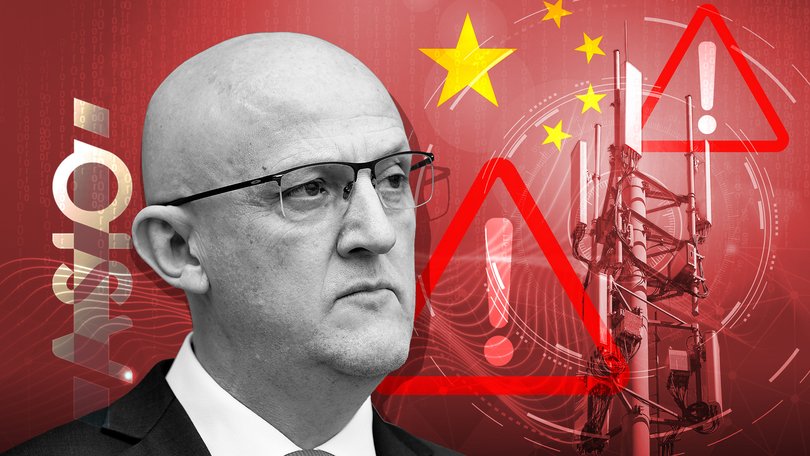ASIO boss Mike Burgess issues Chinese hackers warning, says threshold for ‘high impact sabotage’ is ‘now’
Australia’s domestic spy boss has delivered a fresh warning about ‘Chinese hackers’ seeking to gain access to critical infrastructure assets, including telecommunications networks.

Australia’s financial, telecommunications and utilities systems could be brought down by China in a “high-impact sabotage” attack, the country’s domestic spy boss has warned.
In a speech to the Australian Securities and Investments Commission (ASIC) annual forum, ASIO Director General Mike Burgess has issued a fresh warning about the capabilities of elite “Chinese hackers”.
“I have previously said we’re getting closer to the threshold for high-impact sabotage - well, I regret to inform you – we’re there now,” Mr Burgess told business leaders at the ASIC conference in Melbourne on Wednesday.
Sign up to The Nightly's newsletters.
Get the first look at the digital newspaper, curated daily stories and breaking headlines delivered to your inbox.
By continuing you agree to our Terms and Privacy Policy.“ASIO is aware of one nation state – no prizes for guessing which one – conducting multiple attempts to scan and penetrate critical infrastructure in Australia and other Five Eyes countries, targeting water, transport, telecommunications, and energy networks.
“Authoritarian regimes are growing more willing to disrupt or destroy critical infrastructure to impede decision-making, damage the economy, undermine war-fighting capability and sow social discord.”
The ASIO boss referenced the activities of two Beijing-controlled hacking units known as Salt Typhoon and Volt Typhoon, which he said were “working for the Chinese government and their military”.
“These groups are hackers working for Chinese government intelligence and their military,” he said.
“Both groups were involved in the theft of sensitive information, but the real danger was the threat of sabotage - disruption to critical infrastructure.”
Citing Volt Typhoon’s recent campaign against the US military he said the hackers had compromised American critical infrastructure networks to “pre-position for potential sabotage”.
“The penetrations gave China the ability to turn off telecommunications and other critical infrastructure. And yes, we have seen Chinese hackers probing our critical infrastructure as well.”
“Once access is gained – the network is penetrated – what happens next is a matter of intent not capability. I don’t think we – and I mean all of us – truly appreciate how disruptive, how devastating this could be.”
“Imagine the implications if a nation state took down all the networks? Or turned off the power during a heatwave? Or polluted our drinking water? Or crippled our financial system?” he said.
“I assure you, these are not hypotheticals – foreign governments have elite teams investigating these possibilities right now.
“There are multiple scenarios where a nation state’s intent could shift from stealing and meddling to disruption and damage.”
The Chinese embassy in Canberra has been approached for comment, but has so far not responded to The Nightly.
Mr Burgess also revealed new modelling by the Australian Institute of Criminology and ASIO had estimated cyber-enabled espionage cost the country $12.5 billion in 2023-24, but the impacts could be far more wide-ranging.
“Great power competition is driving unprecedented levels of espionage. A range of countries – some we consider friendly – have a relentless hunger for strategic advantage and an insatiable appetite for inside information,” Mr Burgess said.
“They are aggressively targeting private-sector projects, negotiations and investments that might give foreign companies a commercial advantage. And, like criminals, they have been aggressively targeting customer data.”
Last week at the Lowy Institute in Sydney Mr Burgess accused Beijing of widespread intellectual property theft and political meddling and vowed to continue calling out Chinese Communist Party threats to Australian interests.
Shadow cybersecurity minister Clare Chandler said ASIO’s warning about the threat of state-sponsored hacking attempts should be a wake-up call for Australians and particularly for the Albanese Government.
“Members of the Coalition, myself included, have warned for years about risks from foreign actors, particularly the CCP and Russia, targeting our critical infrastructure,” she said.
“Australians deserve confidence that our essential services, like power, water, transport, and banking, are secure.
“Cyber sabotage could cripple our economy and endanger lives.
“We need urgent, coordinated action to embed security into every layer of critical infrastructure before it’s too late, and I certainly hope the Albanese Government tackles this with the resources and urgency required.”

